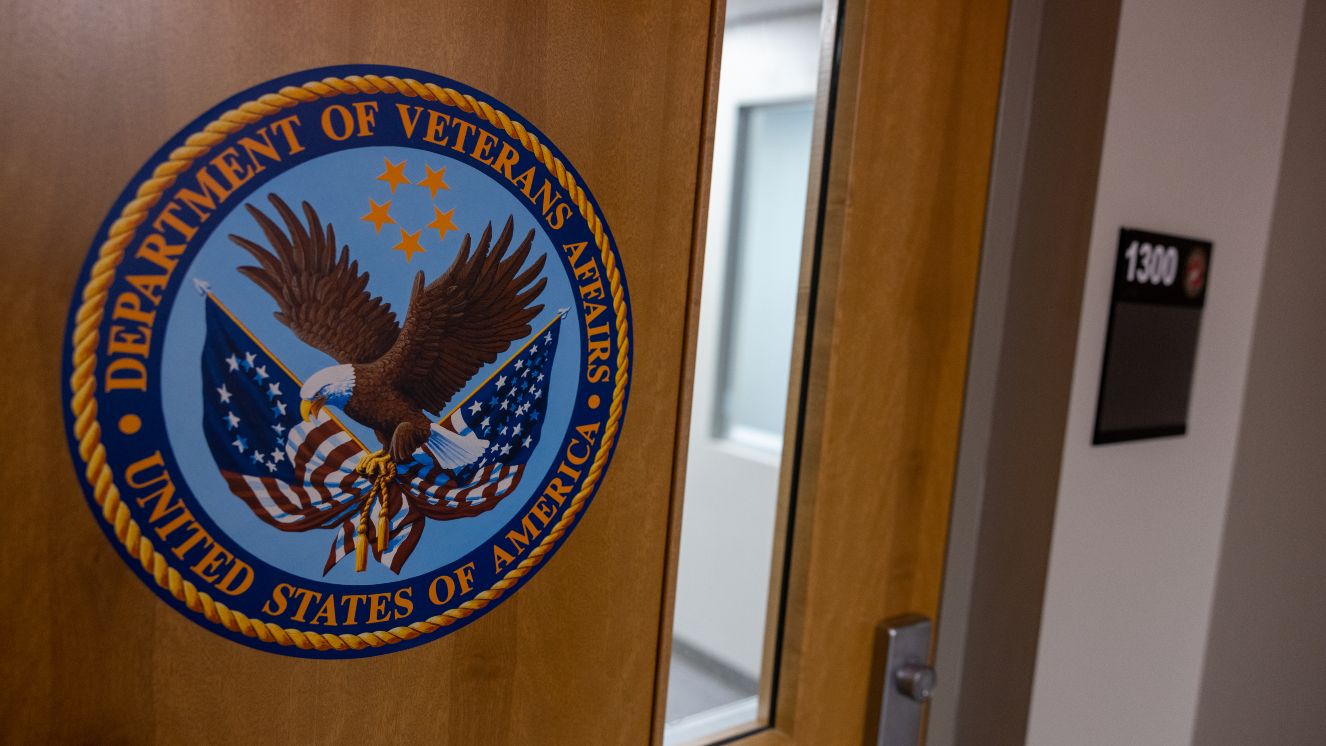VETERANS' SERVICE DOGS: TOP BREEDS AND VA BENEFITS
COMMENT
SHARE

For many Veterans, the toughest battles continue even after their service ends. Daily, over 20% of Veterans face PTSD, traumatic brain injury, mobility issues, or chronic conditions that make life challenging. Service dogs for Veterans are more than pets. They are highly trained partners who offer safety, stability, and a renewed sense of independence.
For Veterans, a service dog isn’t just a companion. It’s a lifeline. “Service dogs help Veterans take responsibility for caring for another life. They’re a partner to lean on, talk to, and are one who will never judge them. And no matter how bad their day is going, that dog will look them in the eyes and show compassion and understanding, no matter what the circumstances are,” shares Jason Johnson, Veteran and founder of Project K-9 Hero.
VA Service Dog Qualification Criteria for Veterans
According to the Americans with Disabilities Act (ADA), a service dog must be trained to perform tasks that are directly related to a person’s disability. These tasks can include guiding, retrieving items, interrupting nightmares, or helping with mobility.
Disabilities that may qualify include:
- PTSD and other mental health disorders
- Vision impairment or blindness
- Hearing loss or deafness
- Mobility impairments
- Traumatic brain injury (TBI)
- Chronic medical conditions that require alerts (e.g., seizures, diabetes)
Service dogs, unlike emotional support animals, are protected by the ADA. This protection allows them to accompany their handlers in public places and on airplanes.
Service Dogs vs. Emotional Support Animals
It’s important to understand the difference:
- Service dogs: Trained for specific tasks. Protected under ADA. Legally allowed in restaurants, airports, and housing.
- Emotional support animals (ESAs): Provide comfort but don’t perform trained tasks. Covered mainly under the Fair Housing Act. Airline policies vary.
Emotional support animals can provide comfort, but service dogs help restore daily function and independence.
Top Dog Breeds for Veteran Service
Any dog with the right temperament and training can become a service dog; however, some breeds stand out due to their exceptional intelligence, loyalty, and discipline. Understanding how each breed's strengths align with specific Veteran needs can help in making the best choice. Here are some top service dog breeds for Veterans, with notes on what makes each breed unique for different challenges:
Labrador Retriever
Labrador Retrievers excel at detecting subtle changes in mood and are quick to alert to distress. Their calm nature makes them effective for maintaining stability, and their eagerness to please accelerates training for tasks such as item retrieval and deep pressure therapy.
German Shepherd
German Shepherds excel at protective presence and can sense anxiety or potential triggers. Their robust build is ideal for physical support, and their high trainability allows for complex commands and public navigation assistance.
Belgian Malinois
Belgian Malinois thrive in structured environments and excel at alerting to medical or emotional episodes. Their stamina suits them for high-activity Veterans, and their focused drive is unmatched for advanced task work.
Doberman
Dobermans develop deep, individualized bonds and respond intuitively to their handler’s emotional state. They adapt quickly to changes in routine or environment, making them reliable in unpredictable situations.
Rottweiler
Rottweilers combine strength with a steady, calming presence. They're adept at mobility tasks, such as supporting transfers or steadying handlers, and their friendly nature helps integrate them into family activities.
Golden Retriever
Golden Retrievers respond compassionately to distress cues and excel at de-escalating anxiety. Their gentle manner makes them trusted in crowds or with children, particularly when providing emotional reassurance.
Standard Poodle
Standard Poodles adapt smoothly across environments and perform both tactile and medical alert tasks. Their hypoallergenic coat is crucial for Veterans with allergies, alongside quick learning for complex routines.
Staffordshire Terrier
Staffordshire Terriers are sensitive to mood shifts and excel at grounding techniques in high-stress scenarios. Consistent training channels their loyalty into strong, dependable support for Veterans coping with PTSD.
VA Process for Acquiring a Service Dog
Getting a service dog is not always easy, but there are resources to help. Veterans can access VA insurance benefits and connect with nonprofit organizations that match them with trained companions.
Veterans can access service dogs through several pathways:
- Nonprofits: Project K-9 Hero, K9s For Warriors, Patriot PAWS, American Humane Society’s Pups4Patriots, Blue Star Service Dogs, and Paws and Stripes train service dogs and provide them at no cost to eligible Veterans. Typically, a Veteran submits an application, completes an interview or assessment, and, if approved, is matched with a trained dog. The nonprofit typically guides applicants through the process, explains eligibility requirements, and offers post-placement support.
- VA Benefits: The VA does not provide dogs directly, but under 38 CFR §17.148, it offers the Service Dog Veterinary Health Insurance Benefit for Veterans with certain disabilities. This benefit covers veterinary care and required equipment.
- Training your own pet is possible with professional support, but it requires temperament testing and extensive training.
- State grants or commissions: Local Veteran programs may offer funding assistance. Research your state’s most recent updates on what’s available to you.
VA Benefits: What’s Covered?
The VA benefit applies to Veterans with visual, hearing, or substantial mobility impairments.
It covers:
- Veterinary insurance for approved dogs
- Required equipment (harnesses, leashes, replacement gear)
- Some travel expenses for placement or replacement
What it doesn’t cover: food, grooming, boarding, or general pet care. Veterans seeking support for their service dogs often rely on nonprofit support and private funding.
Costs and Funding
Service dogs require an investment:
- Training: $15,000–$30,000 (some exceed $50,000). Annual costs: food, vet care, equipment, and insurance (~$500+ per year).
- Grants: Nonprofit and state-level funding can offset expenses. While the cost can be high, many Veterans find that gaining independence and peace of mind is more than worth it.
Service Dog Training and VA Requirements
Training a service dog is rigorous and can take anywhere from 12 to 24 months to complete. The process can be broken down into quarterly milestones to help Veterans track progress and stay motivated:
1. Socialization (Months 1-3): Introducing the dog to various environments and people to ensure it becomes comfortable and well-adjusted.
2. Basic Obedience and Task Training (Months 4-9): Focusing on fundamental commands and starting specific task training related to the Veteran's needs.
3. Advanced Task Training and Public Access (Months 10-18): Refining task performance in different settings and preparing for behavior assessments in public areas.
4. Final Assessment and Placement (Months 19-24): Completing the Public Access Test and ensuring the dog and handler are fully prepared to work as a team. Handlers also train alongside their dogs to establish effective communication and build trust.
Veteran Support Organizations for Service Dogs
Project K-9 Hero
Focuses on training and pairing dogs with Veterans in need, with an emphasis on building trust, resilience, and long-term support between handlers and their service animals.
K9s For Warriors
The nation’s largest provider of service dogs for Veterans with PTSD, traumatic brain injury (TBI), and military sexual trauma (MST). Since 2011, they’ve paired thousands of rescued dogs with Veterans, saving both human and canine lives.
Patriot PAWS Service Dogs
Based in Texas, this nonprofit trains and provides service dogs at no cost to Veterans with mobility and psychiatric needs. Their programs are recognized for quality and for supporting Veterans long after placement.
American Humane’s Pups4Patriots
This program rescues dogs in need and trains them for Veterans living with PTSD or TBI. American Humane ensures every match helps both the animal and the Veteran gain a second chance at life.
Blue Star Service Dogs
Operating since 2010, Blue Star specializes in PTSD service dog training, providing veterans with highly skilled canine partners trained in grounding and emotional support.
Paws and Stripes
Headquartered in New Mexico, this nonprofit pairs Veterans with dogs trained for PTSD, depression, MST, and TBI, while also addressing physical challenges and chronic pain.
Association of Service Dog Providers for Military Veterans
A coalition of service dog organizations advocating nationally for Veteran access and awareness. They work to establish quality standards, share resources, and advocate for legislation supporting service dog programs.
Proper Etiquette Around Service Dogs
If you see a Veteran with a service dog:
- Don’t pet without permission.
- Respect space—don’t distract a working dog.
- Don’t offer food or treats.
- If a dog approaches alone, follow it—it may mean the handler needs help.
Caring for Veteran Service Dogs Long-Term
Service dogs for Veterans support much more than mobility. They foster greater freedom, confidence, and stability. Service dogs can wake handlers during nightmares, help during panic attacks, and guide Veterans through daily routines. Their steadfast presence brings hope for brighter days and a sense of renewed possibility.
Our nation’s support for service dogs shouldn’t end at placement.
“Many of these dogs come to the Veteran extremely healthy, but over time they face their own medical issues,” explained Jason Johnson. “Policymakers need to put a plan in place to help with veterinarian costs, medications, and surgeries, so that the service dog is cared for throughout its life—and not a financial burden on the Veteran who depends on it.”
Johnson’s point underscores the lasting partnership between Veteran and dog, when one serves, both deserve lifelong care.
His words reflect a truth every handler understands: a service dog isn’t a piece of equipment or a temporary aid—it’s a living, breathing partner who gives unconditional loyalty and, often, a reason to keep going. These dogs help Veterans reclaim sleep, security, and peace of mind long after the uniform is folded away. For those who’ve given so much, a service dog can give back what matters most. Independence.
When we invest in service dogs for Veterans, we’re not just funding training—we’re protecting a bond that saves lives.
For every Veteran who’s found calm after chaos or taken their first step toward healing with a four-legged partner by their side, this is where support must continue. Because freedom, for both, should last a lifetime.
Related reads:
Join the Conversation
BY NATALIE OLIVERIO
Veteran & Senior Contributor, Military News at VeteranLife
Navy Veteran
Natalie Oliverio is a Navy Veteran, journalist, and entrepreneur whose reporting brings clarity, compassion, and credibility to stories that matter most to military families. With more than 100 published articles, she has become a trusted voice on defense policy, family life, and issues shaping the...
Credentials
Expertise
Natalie Oliverio is a Navy Veteran, journalist, and entrepreneur whose reporting brings clarity, compassion, and credibility to stories that matter most to military families. With more than 100 published articles, she has become a trusted voice on defense policy, family life, and issues shaping the...



